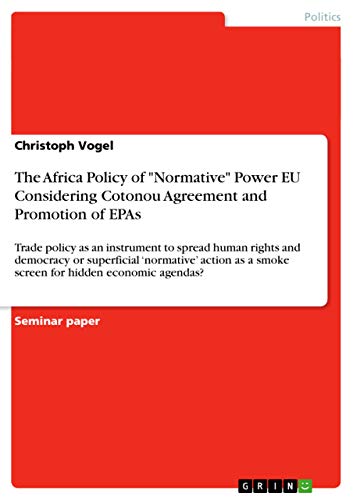Articles liés à The Africa Policy of Normative Power EU Considering...
The Africa Policy of Normative Power EU Considering Cotonou Agreement and Promotion of EPAs - Couverture souple

L'édition de cet ISBN n'est malheureusement plus disponible.
Afficher les exemplaires de cette édition ISBN- ÉditeurGrin Publishing
- Date d'édition2011
- ISBN 10 3656047022
- ISBN 13 9783656047025
- ReliureBroché
- Nombre de pages28
Acheter neuf
En savoir plus sur cette édition
Frais de port :
EUR 23
De Allemagne vers Etats-Unis
Meilleurs résultats de recherche sur AbeBooks
The Africa Policy of "Normative" Power EU Considering Cotonou Agreement and Promotion of EPAs
Description du livre Taschenbuch. Etat : Neu. This item is printed on demand - it takes 3-4 days longer - Neuware -Seminar paper from the year 2009 in the subject Politics - Region: Africa, grade: 1,0, University of Cologne (Forschungsinstitut für Politische Wissenschaft und Europäische Fragen), course: Multilateralism and the EU, language: English, abstract: Economic relations between the EU and ACP countries have a long tradition. After Yaoundéconventions in the 1960s, 1975 the first Lomé Agreement was established between ACPcountries and EC member states. Between 1975 and 2000 EU and ACP countries ran foursubsequent Lomé conventions replaced by Cotonou agreement now. Lomé was concerned tobe an agreement providing ACP countries better access to European markets in order to pusheconomic development and build up domestic production. The emergence of WTO in 1995changed the regulatory framework for regional trade agreements in such a way, that Lomé IVcould not pass into a fifth version. In order to be compliant with WTO measures, a newagreement was worked out 2000 in Cotonou. It came into power in 2002.The complete establishment of that treaty it is still far from becoming reality, as aconsiderable number of ACP countries have still not negotiated EPAs. A crucial issue in thesenegotiations is the division of ACP countries in six groups for regional EPAs. This divisiondoes not merge with other regional trade and political networks in Sub-Saharan Africa anddoes not include all ACP countries.With 'good governance' having emerged as a 'vital' issue in international politics andespecially in EU's agenda, a relevant number of non-economic issues found their way intoCotonou agreement. By linking trade agreements and development aid with the spread ofEuropean or Western democracy 'standards' those different fields were brought into contact.The major question of the following research shall be, whether EU trade policy towards ACPcountries is supposed to be an instrument serving the diffusion of human rights and democracyor rather a 'smoke screen' for a hidden economic agenda.This research will work with different approaches rooted in political science following thebasic assumption EU-ACP cooperation has always been a political relationship. In thefollowing theoretical chapter (neo-)realist interpretation will be put in contrast to Ian Manners''normative' power approach using Lisbeth Aggestam's framework of role model theory.Further on, the research chapter will discuss characteristic matters of EU-ACP relations andput into focus chances and perils of conditional economic cooperation and development aid. 24 pp. Englisch. N° de réf. du vendeur 9783656047025
The Africa Policy of "Normative" Power EU Considering Cotonou Agreement and Promotion of EPAs : Trade policy as an instrument to spread human rights and democracy or superficial ¿normative¿ action as a smoke screen for hidden economic agendas?
Description du livre Taschenbuch. Etat : Neu. Druck auf Anfrage Neuware - Printed after ordering - Seminar paper from the year 2009 in the subject Politics - Region: Africa, grade: 1,0, University of Cologne (Forschungsinstitut für Politische Wissenschaft und Europäische Fragen), course: Multilateralism and the EU, language: English, abstract: Economic relations between the EU and ACP countries have a long tradition. After Yaoundéconventions in the 1960s, 1975 the first Lomé Agreement was established between ACPcountries and EC member states. Between 1975 and 2000 EU and ACP countries ran foursubsequent Lomé conventions replaced by Cotonou agreement now. Lomé was concerned tobe an agreement providing ACP countries better access to European markets in order to pusheconomic development and build up domestic production. The emergence of WTO in 1995changed the regulatory framework for regional trade agreements in such a way, that Lomé IVcould not pass into a fifth version. In order to be compliant with WTO measures, a newagreement was worked out 2000 in Cotonou. It came into power in 2002.The complete establishment of that treaty it is still far from becoming reality, as aconsiderable number of ACP countries have still not negotiated EPAs. A crucial issue in thesenegotiations is the division of ACP countries in six groups for regional EPAs. This divisiondoes not merge with other regional trade and political networks in Sub-Saharan Africa anddoes not include all ACP countries.With 'good governance' having emerged as a 'vital' issue in international politics andespecially in EU's agenda, a relevant number of non-economic issues found their way intoCotonou agreement. By linking trade agreements and development aid with the spread ofEuropean or Western democracy 'standards' those different fields were brought into contact.The major question of the following research shall be, whether EU trade policy towards ACPcountries is supposed to be an instrument serving the diffusion of human rights and democracyor rather a 'smoke screen' for a hidden economic agenda.This research will work with different approaches rooted in political science following thebasic assumption EU-ACP cooperation has always been a political relationship. In thefollowing theoretical chapter (neo-)realist interpretation will be put in contrast to Ian Manners''normative' power approach using Lisbeth Aggestam's framework of role model theory.Further on, the research chapter will discuss characteristic matters of EU-ACP relations andput into focus chances and perils of conditional economic cooperation and development aid. N° de réf. du vendeur 9783656047025

